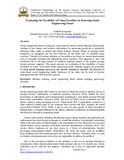| dc.contributor.author | Kengocha, Clifford | |
| dc.date.accessioned | 2020-07-24T06:30:53Z | |
| dc.date.available | 2020-07-24T06:30:53Z | |
| dc.date.issued | 2019-10 | |
| dc.identifier.uri | http://10.1.130.140:8080/xmlui/handle/123456789/381 | |
| dc.description | Full text | en_US |
| dc.description.abstract | Social engineering fraud is among the most notorious forms of fraud through which people
continue to lose money and sensitive information. Its increasing prevalence is negatively
affecting strides made in mobile and digital banking. Despite efforts in creating public
awareness, its mitigation has not been effective as the tricks used by swindlers keep
evolving. Virtually all existing solutions to the problem are based on human interventions
such as manually reporting and blacklisting phone numbers. This approach is slow and
inefficient due to the huge number of incidents reported relative to the limited existing
human resource capacity. This paper presents an evaluation of the feasibility of using
classifiers to detect voice-based social engineering fraud. Findings suggest the possibility
of using natural language processing and machine learning to automate the detection of
voice-based social engineering fraud. Outcomes of the study can be used to develop
automated real-time SEF detection systems. | en_US |
| dc.language.iso | en | en_US |
| dc.publisher | KABARAK UNIVERSITY | en_US |
| dc.subject | Machine learning, social engineering fraud, natural language processing, classifier | en_US |
| dc.title | Evaluating the Feasibility of Using Classifiers in Detecting Social Engineering Fraud | en_US |
| dc.type | Article | en_US |

